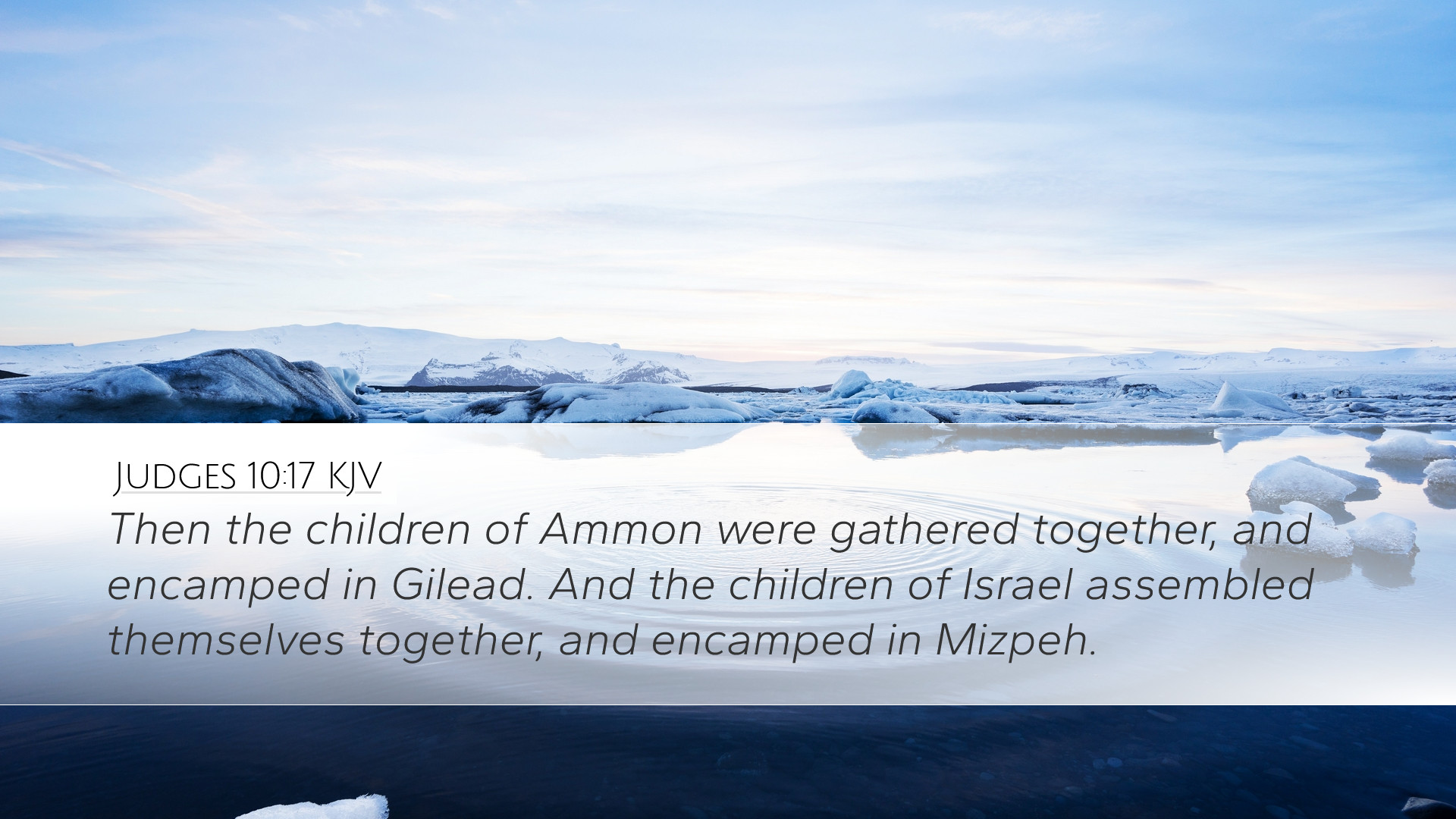Old Testament
Genesis Exodus Leviticus Numbers Deuteronomy Joshua Judges Ruth 1 Samuel 2 Samuel 1 Kings 2 Kings 1 Chronicles 2 Chronicles Ezra Nehemiah Esther Job Psalms Proverbs Ecclesiastes Song of Solomon Isaiah Jeremiah Lamentations Ezekiel Daniel Hosea Joel Amos Obadiah Jonah Micah Nahum Habakkuk Zephaniah Haggai Zechariah MalachiJudges 10:17
Judges 10:17 KJV
Then the children of Ammon were gathered together, and encamped in Gilead. And the children of Israel assembled themselves together, and encamped in Mizpeh.
Judges 10:17 Bible Commentary
Commentary on Judges 10:17
Introduction
Judges 10:17 presents a critical moment in the narrative of Israel's cyclical patterns of sin, oppression, repentance, and deliverance. This verse encapsulates the intense turmoil faced by the Israelites and their appeal for divine assistance. The following commentary draws insights from renowned public domain commentaries including those of Matthew Henry, Albert Barnes, and Adam Clarke, providing a comprehensive exploration of this pivotal scripture.
Text of Judges 10:17
"Then the children of Ammon were gathered together, and encamped in Gilead. And the children of Israel assembled themselves together, and encamped in Mizpeh."
Contextual Background
The book of Judges details a tumultuous period in Israel's history marked by a failure to follow God's commands, leading to a cycle of oppression and deliverance. This particular verse mentions the confrontation between Israel and the Ammonites, emphasizing the geopolitical tensions of the time.
The Ammonite Threat
According to Albert Barnes, the Ammonites, descendants of Lot, were perennial adversaries of Israel, often seeking to invade and oppress Israelite territories. Their gathering signifies a major military threat and highlights the challenges faced by Israel in remaining faithful to God's covenant amidst external pressures.
Israel’s Response
Matthew Henry notes that the encampment of the Israelites at Mizpeh represents a moment of unity and resolve among the tribes. Unlike previous occasions where discontent and division prevailed, the assembly at Mizpeh indicates a collective acknowledgment of their precarious situation and a need for divine intervention.
Theological Reflection
This verse serves not only as a historical account but also as a theological reflection on the nature of human reliance on God amidst adversity. The Israelites, recognizing their plight, are drawn together in assembly, indicative of the body of Christ gathering for collective prayer and discernment in contemporary contexts.
The Power of Unity
Adam Clarke emphasizes the significance of corporate unity in seeking God's assistance. The act of assembling at Mizpeh symbolizes a return to communal dependence on God, stressing that isolation in times of crisis can hinder divine aid. This reflection invites pastors and theologians to consider the importance of congregational cohesion in spiritual warfare.
The Role of Leadership
The mention of Mizpeh as a place of gathering suggests that leadership plays a crucial role in convening God’s people during times of desperation. Matthew Henry remarks on the necessity of strong, God-fearing leaders who guide assemblies toward rightful supplication before God. The exemplary response of leaders in engaging the people in prayer and action is essential for navigating crises.
Lessons for Today
Judges 10:17 provides timeless lessons for today's church and individual believers. Among these are:
- Recognizing Spiritual Reality: Just as Israel acknowledged their danger, believers are encouraged to discern the spiritual battles at play in their lives and communities.
- Calling for Unity: In a fragmented world, the imperative for believers to assemble for prayer and action remains critical.
- Seeking Divine Intervention: The response of the Israelites is a powerful reminder of the necessity of turning to God for help, especially in collective adversity.
Practical Application
Pastors and church leaders are invited to reflect on how they can facilitate unity within their congregations during times of challenge, emphasizing prayer as a communal effort. The insights from Henry, Barnes, and Clarke guide leaders in creating environments where congregants feel safe and compelled to unite in fervent prayer seeking God’s grace and intervention.
Conclusion
Judges 10:17 is a compelling reminder of the cyclical nature of faith and community in responding to divine challenges. The reflections drawn from historical and theological lenses provide an extensive understanding relevant to today’s spiritual context. Engaging with the complexity of this scripture fosters greater appreciation for the ongoing narrative of God's people and their need for His mercy and guidance.


